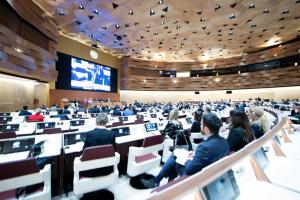
In the 75 years of its existence UNECE has proved to be an effective platform for cooperation among countries in the pan-European region and beyond, facilitating economic development and integration. Yet, due to ongoing multiple crises, the region is further away from achieving the 2030 Agenda for Sustainable Development than it was a year ago. In this context, UNECE’s 70th Commission session (18-19 April) focused on exploring how digital and green transformations can advance the implementation of the 2030 Agenda, a major policy concern across the region, with multiple ramifications across different domains.
“For UNECE, digitalization opens new opportunities to enhance the implementation of its mandates, across the normative, policy advisory and capacity-building dimensions,” said UNECE Executive Secretary Olga Algayerova. “We are already using this potential in our work across sectors. But ultimately, we must adapt our policy and regulatory frameworks to the new context created by digital transformation to stir the changes in a direction that advances the implementation of the 2030 Agenda.”
During the high-level segment of the 70th Commission session, Ministers and delegations from 56 UNECE member States considered actions to promote the adoption of digital technologies to address environmental challenges, enhance inclusion and increase prosperity for all. Delegates agreed that UNECE’s 75 years of multilateral cooperation on regulatory and policy instruments should be harnessed to make the Commission fit for the sustainable development challenges the region is facing.
They discussed policy initiatives to maximize beneficial impacts of the digital transformation for sustainable development and initiatives aimed at accelerating the green transformation and a shift to a circular economy and the sustainable use of natural resources. They paid particular attention to the transition towards sustainable energy and the deployment of low carbon solutions, climate change and biodiversity loss, the reduction of environmental pressures, and opening up of new possibilities for economic development, policy implementation and the management of public services.
To succeed in the digital and green transformations, UNECE member States should build reliable and resilient partnerships, based on transparency, trust and jointly developed standards, regulations and policies. Above all, delegates agreed that the full potential of the digital transformation to deliver on the 2030 Agenda will only be fulfilled if countries pay close attention to digital inclusion, ensuring access to digital connectivity for all, in particular women, children, older persons and persons with disabilities.
“A digital divide persists with parts of the population lacking access to the Internet, to digital devices or digital skills and literacy, thus amplifying the existing social, cultural, and economic inequalities,” reminded Ms. Algayerova. “We must avoid – and where it already exists bridge - the digital divide for different demographic groups, be they defined by gender, disability, or age.”
Wider stakeholder engagement needed to ensure an inclusive digital and green future
To enrich discussions and strengthen engagement with the private sector, academia, civil society, and youth, in the lead up to the 70th Commission session UNECE had organized three virtual side events (3-5 April), exploring three prominent themes to help shape the future of the pan-European region:
-
Promoting Circular Economy and Sustainable Use of Natural Resources;
-
Digital and Green Transformations for Sustainable Development;
-
Horizon-Scanning: Future of Regulations in the Pan-European Region.
Gathering 76 speakers and 700 participants, the side events focused on how digital and green solutions can help scale the circular economy by driving innovation, improving resource efficiency, and building circular supply chains. Participants agreed that to be efficient and to facilitate the circular economy, digital solutions require proper regulatory frameworks to reduce associated environmental impacts and digital risks, and to ensure their responsible use, accountability, and transparency.
Speakers highlighted the importance of foresight and “future-ready” policymaking to help and equip decisionmakers to better deal with future challenges in a proactive manner. Although a number of UNECE member States and international institutions have already incorporated foresight into their governing strategies, many would benefit from stronger understanding of the potential of foresight for policymaking and related knowledge skills and capacities.
New knowledge, skills and expertise are needed to better anticipate and prepare for uncertain future and to develop agile and robust policies addressing risks of multiple crises and leveraging opportunities for a sustainable and equitable economic development in the UNECE region.
To strengthen the engagement of young people in UNECE’s work and discussions, the 70th Commission session featured an exchange of views on promoting digital and green transformations for sustainable development between students from the University of Geneva and Ministers of UNECE member States, including representatives of the Canton of Geneva.
Decisions adopted by the 70th Commission
Building on the successful previous sessions, Member States decided to continue to convene annual sessions of the Regional Forum on Sustainable Development to follow up and review the implementation of the 2030 Agenda for Sustainable Development, in close cooperation with the entities of the regional United Nations system and with active engagement of other relevant stakeholders.
Member States elected Switzerland to Chair the Commission for the next two years, alongside Vice-Chairs Austria and Montenegro.
Member States also adopted (40 votes in favour, 2 against and 5 abstentions) a resolution on the economic and social effects of Russia’s aggression against Ukraine.

